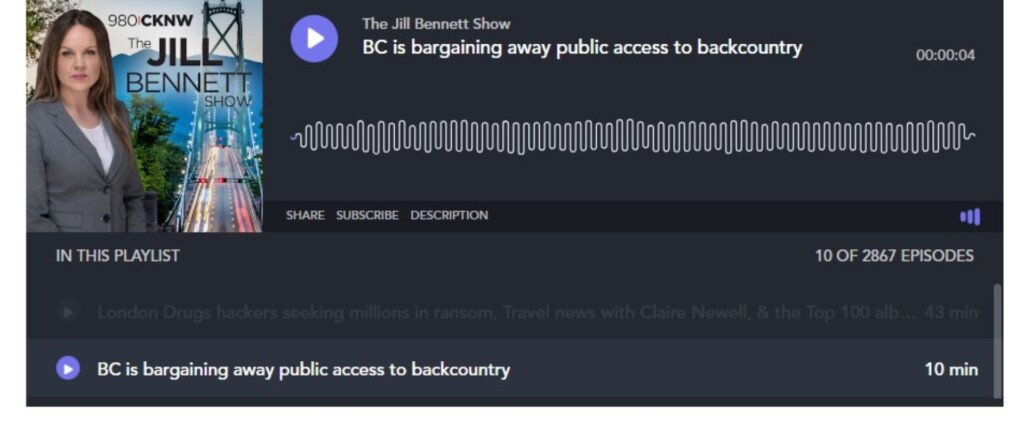Every new iteration of the Hunting and Trapping Regulations erodes public access to outdoor recreation, while the government hides its true motives and ducks accountability.
The provincial government is implementing strategies for conservation that have proven to be ineffective, instead of using on-the-ground actions that could really make a difference.
For the second time in two years, the regulation has placed unnecessary restrictions on access to moose and caribou.
“The vast majority of these changes are not supported by the government’s own data, policy and procedures, nor its wildlife biologists” said B.C. Wildlife Federation Executive Director Jesse Zeman. “If the government is going to ignore science and their own staff, wildlife management is headed to a very dark place and public access to Beautiful British Columbia is going to suffer.
In 2022, the province shut down the caribou hunt in the Peace Region and announced that the moose harvest would be restricted by 50 per cent and converted to limited entry hunting in some areas for one year. The harvest rate for moose was reduced to 1.3 per cent, well below the sustainable harvest rate of 5-10 per cent. (2021 ABMI Modelling)
At that time, the government promised $2 million for public consultation, a roundtable and a post-hunting season management review within one year. Two years later, we are still waiting for those consultations, the management review, and the so-called one-year restrictions are still in place.
According to documents acquired by Freedom of Information and Protection of Privacy Act (FOIPPA) requests, the government is aware that changes to the moose regulation “will not impact the moose population.”
Their commitment to avoid facing the public on this issue is understandable, after their limited online consultation in 2022 for the proposed moose regulation came back with nearly 100 per cent opposed.
“When a proposal attracts near unanimous opposition by British Columbians, you’d think the government would at least pause and think ‘maybe we aren’t getting this right,’” said Zeman. “When nearly everyone thinks you are getting it wrong, the rational thing to do start over.”
The province cites improving wildlife stewardship, upholding First Nations’ hunting rights and enhanced habitat conservation as reasons for the changes. The changes to the regulations address neither.
The caribou hunt was ended after the court ruled that the cumulative impacts of industrial encroachment in the Peace region infringed the treaty rights of the Blueberry First Nations. But caribou hunting had already been closed in areas where the herds were at risk to ensure sustainability.
Rather than address the industrial encroachment cited by the judge, the government cooked up a deal to keep their oil and gas play at the expense of resident hunters. Worse, they are applying similar restrictions in areas not covered by the ruling.
Hunting for an increasing number of species is being converted from General Open Season to lottery-based Limited Entry Hunts. The increasing number of LEH hunts will likely have a negative effect on tourism, funding for conservation and visitor spending.
“The province has committed to British Columbians to make decisions in a transparent, evidence-based manner, but these decisions demonstrate the opposite,” said Zeman. The provincial government should be supporting campers, hikers, hunters and anglers who are sustainably enjoying nature, not cancelling them.”
The BCWF believes that B.C.’s Hunting and Trapping amendments set a dangerous precedent by relying on emotion and political considerations, rather than science and data. B.C. has some of the lowest hunter density numbers in North America. Further restrictions based on political popularity are not required, nor are they welcome. We have 40 years of policy and procedure in place to ensure that harvests are sustainable, and that wildlife is supported and conserved.
“While British Columbians are trying to fill their freezers in an unstable economy, the government continues to put restrictions and remove science and evidence-based hunting seasons. We are incredibly disappointed that wildlife is continuing to be a pawn in a political game,” said BCWF President David Lewis.
The B.C. Wildlife Federation is committed to reconciliation and co-management of this province’s natural resources with First Nations and show it every day through our work with countless communities around the province.
“Rather than pursuing policies they know won’t work, the government needs to protect endangered species, restore wildlife and follow existing policies to guide conservation and recreation decision-making,” said Zeman.
If you are as incensed by this egregious overreach of political power as we are, make sure you contact your MLA and let them know that wildlife and access to the outdoors should be a commodity shared by all British Columbians and it is time to Put Wildlife First.
Find the contact information for your MLA here.
Review the Hunting & Trapping Regulations Synopsis here.
Review the Freedom of Information request information referenced in this article here, here, and here.
Bonus: Listen to Jesse Zeman on the Jill Bennett Show talking about this issue.

